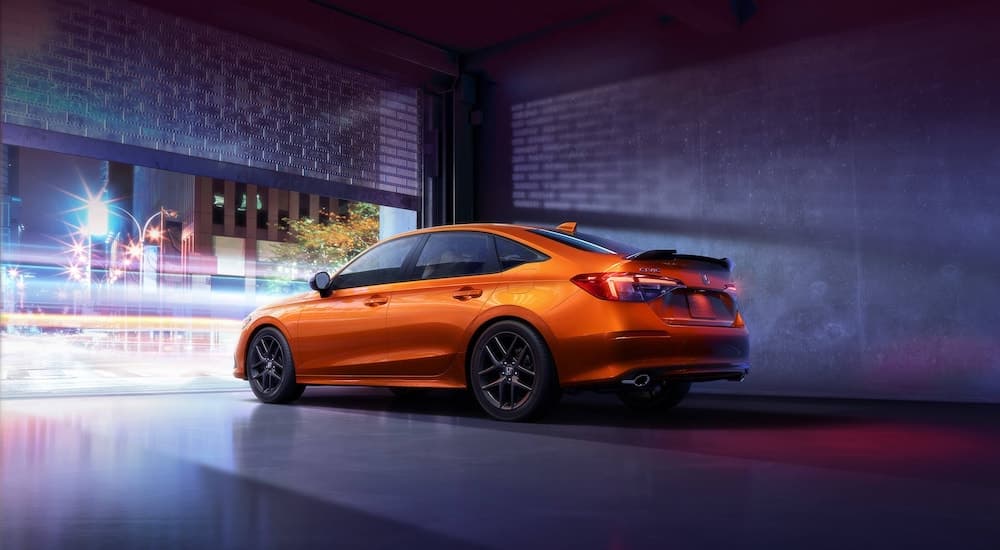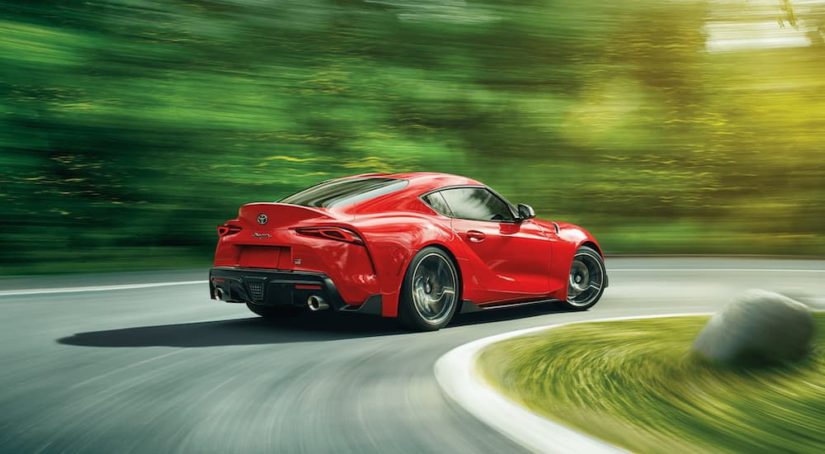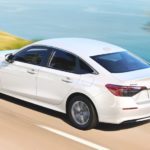Toyota and Honda are the two largest Japanese automobile manufacturers, and both are renowned for building vehicles that are safe, reliable, practical, and efficient. These two manufacturers go head to head in almost every segment of the market, making it even tougher for shoppers to choose between the two brands. From comparing the Toyota RAV4 vs Honda CR-V to cross-shopping the Honda Civic vs Toyota Corolla, determining which manufacturer is right for you can be a daunting task. They have even developed very similar technologies for their models, ranging from advanced driver-assist features to fuel-saving hybrid technologies.
However, there are a few differences between Toyota and Honda that stand out. Toyota is known for prioritizing proven technologies over the latest and greatest. This can be both good and bad, as it gives Toyota a small lead over Honda when it comes to reliability, but it also means that Toyota models are often using an older technology. Honda, in turn, stands out for a slight edge in fuel efficiency and for imbuing its vehicles with sportier handling. So while Toyota and Honda are extremely similar in many ways, drivers will often discover that they prefer one of these brands to the other.

Toyota vs Honda: Sedan and Hybrids
While the American manufacturers are discontinuing their sedan models, Toyota and Honda have continued to invest in building these efficient and practical vehicles. However, their sedan lineups have been pared down in recent years to focus on their best-selling compact and midsize models. When it comes to compact sedans, the Honda Civic faces off against the Toyota Corolla. Both models are available as either a hatchback or a sedan, adding to their versatility, but the Civic comes out on top for offering more space and a 1.5L turbocharged engine that is both more powerful and more efficient than the Corolla’s engine options.
The tables are turned for the midsize sedans, and the Toyota Camry is the clear winner when compared to the Honda Accord. Both of these sedans are offered with two traditional gasoline engines and an optional hybrid powertrain, but Toyota offers a more impressive package. While the standard Accord is a bit quicker and more efficient, the Camry is a more comfortable, reliable, and refined car. This is particularly true of the Camry hybrid, which offers remarkable fuel economy.
Toyota offers more hybrid sedan options overall compared to Honda, including a Corolla Hybrid and two versions of the iconic Toyota Prius. While Honda does have the hybrid Honda Insight, the Insight is scheduled to be discontinued at the end of this year in favor of a new Civic Hybrid. In general, buyers looking for an affordable hybrid sedan will be best served by the Corolla Hybrid, while buyers seeking maximum efficiency should opt for the Prius or the plug-in hybrid Prius Prime.
Toyota vs Honda: Small SUV Options
SUVs are the most popular vehicles in America today, and the models from Toyota and Honda lead the pack. When it comes to the smaller subcompact and compact options favored by most drivers, these two brands have a lot to offer, but Toyota has a few more options overall. When it comes to subcompact models, the Honda HR-V faces off against the Toyota C-HR and the new Toyota Corolla Cross. The HR-V soundly trounces the C-HR in this matchup, offering all-wheel drive and significantly more cargo space at a lower price, but the Corolla Cross is a closer competitor with a much more compelling powertrain.
In the compact SUV segment, the Honda CR-V competes against the Toyota RAV4 and the Toyota Venza. However, the RAV4 solidly deserves its position as the best-selling SUV in America, offering more power and more features. And while both the RAV4 and CR-V offer a hybrid powertrain as an option, only the RAV4 has a plug-in hybrid variant with impressive performance. If you are looking for something a bit more premium, then the Toyota Venza is the vehicle for you, with a standard hybrid powertrain and a tech-heavy interior.
Toyota vs Honda: Large SUV Options
When it comes to larger SUVs, Honda and Toyota take two different paths. Honda offers a pair of related midsize crossover models that are well-suited for families. The two-row Honda Passport and the three-row Honda Pilot both have generous cargo space and standard V6 engines with solid fuel economy figures. Toyota offers a three-row midsize crossover of its own, the Toyota Highlander, which is available in both V6 and hybrid versions. Overall, the Highlander is the most popular model in its segment and beats the Pilot on most counts, but if you don’t want that third row of seats, the Passport is your only choice.
But Toyota’s large SUV options are limited to midsize crossovers. Toyota also sells two truck-based body-on-frame SUVs that Honda has no answer to. The midsize Toyota 4Runner is based on the Toyota Tacoma and offers some impressive off-road capabilities, particularly in its TRD (Toyota Racing Development) variants. The full-size Toyota Sequoia takes a different route and is based on the Toyota Tundra. This family-friendly three-row model provides plenty of space inside and high tow ratings if you need to pull a trailer.
Toyota vs Honda: Pickup Trucks
While both Toyota and Honda sell pickup trucks, their vehicles are aimed at very different segments. The midsize Toyota Tacoma is the best-selling truck in its segment by a huge margin, outselling the next three models combined, and is beloved by off-road adventurers for its bullet-proof construction. Honda also has a midsize truck, the Honda Ridgeline, but it is a unique unibody design based on the Honda Pilot SUV. This makes the Ridgeline poorly suited to tackling muddy trails but gives it the best road performance of any truck in its class. Finally, there is the full-size Toyota Tundra, which has no Honda equivalent. If you are looking for serious towing and hauling capabilities, this truck is in a class of its own.
Toyota vs Honda: Minivans
Minivans may be falling out of style these days, but Toyota and Honda still manufacture these versatile family vehicles. And while you might think all minivans are more or less the same, the Toyota Sienna and Honda Odyssey are radically different. Both of these models share the same familiar minivan style, but Toyota opted to make an efficient hybrid powertrain standard. Honda fitted its minivan with a traditional V6 engine, resulting in substantially worse fuel economy, but the Odyssey has better performance and considerably more cargo space. Depending on your priorities, one of these two models will likely immediately leap out as the better option.

Toyota vs Honda: Sports Cars
Perhaps the largest difference between Toyota and Honda is their lineup of sports cars and performance vehicles. Honda’s option for the driving enthusiast is the Honda Civic Si, a souped-up version of the standard Honda Civic equipped with a 200-horsepower turbocharged engine, limited-slip differential, and other performance upgrades. Honda also has an even more serious Type R version set to release in the near future, which is expected to offer over 300 horsepower, making it the fastest front-wheel drive car on the market.
Toyota instead offers two rear-wheel drive sports cars and an all-wheel drive hot hatch. The Toyota GR86, which shares a platform with the Subaru BRZ, is the most affordable model and has a 228-horsepower naturally aspirated engine. The Toyota GR Supra is the more powerful car and can be optioned with either a turbocharged four-cylinder with 258 horsepower or a turbocharged inline-six with 382 horsepower. Finally, the new GR Corolla is based on the GR Yaris rally car and provides an even 300 horsepower from a turbocharged three-cylinder.



